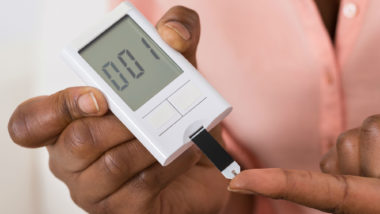
Diabetics taking metformin will be glad to know that it does not cause flesh-eating bacteria; however, there are other diabetic drugs that have been associated with these destructive infections. While metformin has its own side effects, these are minor, for the most part.
Diabetic medications of the SGLT2 inhibitor class are another matter; these have been linked to numerous serious, and even life-threatening side effects, and have been a cause of action in many recent lawsuits.
What is Metformin?
Metformin is a medication derived from the French lilac plant, which was used for centuries in folk medicine to treat what was once known as the “sweetwater sickness.”
Sold under several brand names (including Glucophage, Fortamet, Glumetza, and Riomet), metformin is part of the biguanide class of diabetic drugs; it essentially slows down the liver’s production of glucose while decreasing absorption of glucose in the gastrointestinal tract. Biguanides are not known to cause flesh-eating bacteria.
What Are the Side Effects of Metformin?

What Are SGLT2 Inhibitors?
The first drug of this class, Invokana (a combination of canagliflozin and metformin hydrochloride), came onto the market in March 2013. It was granted conditional FDA approval, despite serious concerns expressed by prominent physicians over possible cardiovascular problems.
Since that time, SGLT2 inhibitors have been implicated in numerous serious side effects, including kidney damage, acute pancreatitis and increased risk of diabetic amputation.
How Could SGLT2 Inhibitors Cause Flesh-Eating Bacteria?
The connection between SGLT2 inhibitors and the flesh-eating bacterial infection known as Fournier’s Gangrene appears to be related to these medications’ mechanism of action. Drugs such as Invokana and others of the SGLT2 inhibitor class work by preventing the kidneys from reabsorbing excess blood sugar, which would normally be released back into the bloodstream.
Instead, it is passed through urination. This creates an environment in which bacterial and fungal infections can thrive.
What is significant is that Fournier’s Gangrene is normally a very rare disease, primarily affecting older male diabetics who also suffer from a compromised immune system and abuse of alcohol. Prior to the introduction of SGLT2 inhibitors, fewer than 20 cases were reported in the U.S. over a 30-year period. In the six years since SGLT2 inhibitors were introduced, there have been 55 cases reported – several of which were diagnosed in female patients with no history of alcoholism.
The FDA warned about Fournier’s Gangrene, also known as necrotizing fasciitis, back in August 2018. “Cases of a rare but serious infection of the genitals and area around the genitals have been reported with the class of type 2 diabetes medicines called sodium-glucose cotransporter-2 (SGLT2) inhibitors,” the FDA warned. With the warning, the federal agency also required a new warning about this risk be included with the prescribing information on these medications.
What Specific Diabetic Medications Could Be Linked?
Brand names of drugs in the SGLT2 inhibitor class available in the U.S. that may cause Fournier’s Gangrene include the following:
- Invokana
- Farxiga
- Jardiance
- Steglatro
Is Fournier’s Gangrene Fatal?
Untreated, it can be; according to a 2009 study published in the Journal of Urology, the mortality rate from Fournier’s Gangrene is approximately 7.5 percent. Diagnosed early, however, it can be treated with antibiotics and the surgical removal of the affected tissues. Because the flesh-eating bacteria that causes the disease is anaerobic in nature (they cannot survive in the presence of oxygen), hyperbaric oxygen therapy may also be effective.
Can I File an SGLT2 Inhibitor Lawsuit?
A growing number of patients who take SGLT2 inhibitors like Invokana are coming forward with allegations of serious side effects, including Fournier’s Gangrene. Lawsuits allege that patients were not warned about the serious side effects associated with the drug.
If you or someone you love has suffered from these or other side effects after taking an SGLT2 inhibitor like Invokana, you may be able to file a lawsuit and pursue compensation. Filing a lawsuit cannot take away the pain and suffering caused by these kinds of complications, nor can it bring a loved one back to life, but it can at least help to alleviate the financial burden incurred by medical expenses, lost wages, and more.
Filing a lawsuit can be a daunting prospect, especially in the wake of major health issues, so Top Class Actions has laid the groundwork for you by connecting you with an experienced attorney. Consulting an attorney can help you determine if you have a claim, navigate the complexities of litigation, and maximize your potential compensation.
Join a Free Diabetes Medications & Flesh-Eating Infection Lawsuit Investigation
The type-2 diabetes medications linked to the flesh-eating infection include:
- Invokana
- Invokamet/Invokamet XR
- Farxiga
- Xigduo XR
- Qtern
- Jardiance
- Glyxambi
- Synjardy/Synjardy XR
- Steglato
- Segluromet
- Steglujan
If you or a loved one took one of the type-2 diabetes medications listed above and suffered from a flesh-eating genital infection, you may qualify to join this diabetes medication lawsuit investigation. Fill out the FREE form on this page for more information.
ATTORNEY ADVERTISING
Top Class Actions is a Proud Member of the American Bar Association
LEGAL INFORMATION IS NOT LEGAL ADVICE
Top Class Actions Legal Statement
©2008 – 2025 Top Class Actions® LLC
Various Trademarks held by their respective owners
This website is not intended for viewing or usage by European Union citizens.
Get Help – It’s Free
Join a Free Diabetes Medications & Flesh-Eating Infection Lawsuit Investigation
If you qualify, an attorney will contact you to discuss the details of your potential case at no charge to you.
PLEASE NOTE: If you want to participate in this investigation, it is imperative that you reply to the law firm if they call or email you. Failing to do so may result in you not getting signed up as a client or getting you dropped as a client.
E-mail any problems with this form to:
[email protected].
Oops! We could not locate your form.












